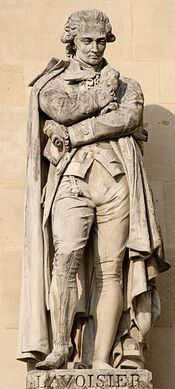Tribute to Antoine Lavoisier (nonfiction): Difference between revisions
No edit summary |
No edit summary |
||
| Line 8: | Line 8: | ||
[[Antoine Lavoisier (nonfiction)|Antoine Lavoisier]] (26 August 1743 – 8 May 1794): | [[Antoine Lavoisier (nonfiction)|Antoine Lavoisier]] (26 August 1743 – 8 May 1794): | ||
Antoine-Laurent de Lavoisier (also Antoine Lavoisier after the French Revolution; French: [ɑ̃twan lɔʁɑ̃ də lavwazje]; 26 August 1743 – 8 May 1794) was a French nobleman and chemist central to the 18th-century chemical revolution and had a large influence on both the history of chemistry and the history of biology. | |||
He is widely considered in popular literature as the father of modern chemistry. | |||
He played a key role in changing chemistry from a qualitative science to a quantitative science. | |||
Lavoisier is most noted for his discovery of the role oxygen plays in combustion. He recognized and named oxygen (1778) and hydrogen (1783) and opposed the phlogiston theory. | |||
Lavoisier helped construct the metric system, wrote the first extensive list of elements, and helped to reform chemical nomenclature. | |||
He predicted the existence of silicon (1787) and was also the first to establish that sulfur was an element (1777) rather than a compound. | |||
He discovered that, although matter may change its form or shape, its mass always remains the same. | |||
Lavoisier was a powerful member of a number of aristocratic councils, and an administrator of the ''[[Ferme générale (nonfition)|Ferme générale]]''. The ''Ferme générale'' was one of the most hated components of the ''[[Ancien Régime (nonfiction)|Ancien Régime]]'' because of the profits it took at the expense of the state, the secrecy of the terms of its contracts, and the violence of its armed agents. All of these political and economic activities enabled him to fund his scientific research. | |||
<div style="font-size:90%;letter-spacing:.4rem;float:right;color:#555555">GnomonChronicles.com</div> | <div style="font-size:90%;letter-spacing:.4rem;float:right;color:#555555">GnomonChronicles.com</div> | ||
Revision as of 18:36, 8 May 2020

—Lavoisier by Jacques-Léonard Maillet. Stone, ca. 1853. 5th statue from Pavillon Colbert to Pavillon Sully, Cour Napoléon in the Louvre.
Antoine Lavoisier (26 August 1743 – 8 May 1794): Antoine-Laurent de Lavoisier (also Antoine Lavoisier after the French Revolution; French: [ɑ̃twan lɔʁɑ̃ də lavwazje]; 26 August 1743 – 8 May 1794) was a French nobleman and chemist central to the 18th-century chemical revolution and had a large influence on both the history of chemistry and the history of biology. He is widely considered in popular literature as the father of modern chemistry.
He played a key role in changing chemistry from a qualitative science to a quantitative science.
Lavoisier is most noted for his discovery of the role oxygen plays in combustion. He recognized and named oxygen (1778) and hydrogen (1783) and opposed the phlogiston theory.
Lavoisier helped construct the metric system, wrote the first extensive list of elements, and helped to reform chemical nomenclature.
He predicted the existence of silicon (1787) and was also the first to establish that sulfur was an element (1777) rather than a compound.
He discovered that, although matter may change its form or shape, its mass always remains the same.
Lavoisier was a powerful member of a number of aristocratic councils, and an administrator of the Ferme générale. The Ferme générale was one of the most hated components of the Ancien Régime because of the profits it took at the expense of the state, the secrecy of the terms of its contracts, and the violence of its armed agents. All of these political and economic activities enabled him to fund his scientific research.
In the News
Fiction cross-reference
Nonfiction cross-reference
External links
- Antoine Lavoisier @ Wikipedia